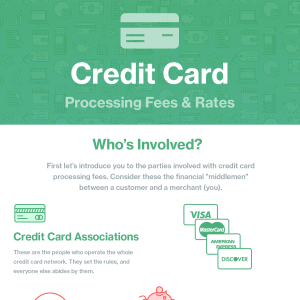Does your business need to accept credit card payments? Find out what a merchant account is, how you can set one up, and how much you'll pay.
Our content reflects the editorial opinions of our experts. While our site makes money through
referral partnerships, we only partner with companies that meet our standards for quality, as outlined in our independent
rating and scoring system.
In its simplest form, a merchant account is a temporary holding place for funds from approved credit and debit card transactions. Think of it as a safe pit stop for your money before it moves into your main business bank account. Without one, accepting card payments is impossible, making it an essential tool for any modern business.
In this guide, we’ll cover how merchant accounts work, typical costs and fees, how to set up one, and tips for choosing the best merchant account provider for your business.
What Is A Merchant Account?
A merchant account is a type of bank account that holds money from your credit and debit card sales until it’s transferred to your regular business bank account. It works online, in-store, or on the go.
Unlike a normal bank account, you don’t directly access funds in a merchant account. Instead, your provider automatically deposits cleared funds into your business account, usually within 3–5 business days. Many providers now offer next-day or same-day funding, often for an extra fee.
Benefits Of Merchant Accounts
While opening and maintaining a merchant account can be costly, the advantages usually outweigh the downsides. With a merchant account, you can:
- Boost sales volume by accepting cards
- Reduce reliance on cash and checks
- Accept online payments
- Have enhanced security over cash or checks
- Access analytics and reporting for business insights
- Save time on trips to deposit cash or checks
How Merchant Accounts Work
When you open a merchant account, you get access to credit card terminals for in-person sales and payment gateways for online transactions. These tools send your customers’ card data to your provider’s processing network, which then communicates with the cardholder’s bank to confirm available credit and run anti-fraud checks.
If everything checks out, the transaction is approved, and the issuing bank sends the funds to your merchant account. Your payment processor then deducts applicable fees — interchange fees, card network fees, and the processor’s markup — before transferring the remaining funds to your business bank account.
Today, most merchant accounts go beyond simple credit card processing. They often support alternative payment methods like ACH transfers, eChecks, and QR code payments. Many also offer added services such as analytics and reporting, loyalty programs, gift card management, inventory tracking, and employee scheduling.
What About Debit Card Processing?
Debit card transactions work similarly to credit card transactions, but the money comes directly from the customer’s bank account. The final step — releasing funds to your merchant account and then to your bank — can take anywhere from a few hours to several business days, depending on the bank and debit network.
Transactions that use a PIN are processed on a separate network, which is generally more secure. Because of this added security, processing fees for PIN-based debit transactions are usually lower than those for credit cards.
The Different Types Of Merchant Accounts
Although some providers offer accounts tailored for specific industries, the core function is the same: holding transaction funds until they’re deposited in your business bank account.
There are two main types of merchant accounts: full-service merchant accounts and aggregated accounts.
| Type |
Features |
Pros |
Cons |
| Full-Service |
Dedicated account with a unique Merchant ID (MID); requires underwriting |
Stable and less likely to be frozen |
Longer approval process; more setup effort |
| Aggregated (PSPs like Square/PayPal) |
Shared account pooled with other merchants; fast signup with no underwriting |
Quick setup; easy to start accepting payments |
Higher risk of account holds/freezes; less control |
Another distinction is between low-risk and high-risk accounts. Most retail and restaurant businesses are low-risk, while industries like adult entertainment, CBD products, and vape shops are high-risk.
If you’re a high-risk merchant, you may have to:
- Get a full-service merchant account
- Undergo an extensive underwriting process
- Have your account underwritten by an offshore bank or processor
- Sign a long-term contract
- Pay higher processing rates (2-3 times higher than for a low-risk business)
- Include a rolling reserve account when first opened
Where Do You Find Merchant Accounts?
Finding the right merchant account provider can be tricky, especially with hundreds of options on the market. Some ways to start include:
- Through your bank: Quick approval and expedited funding is a plus, but banks rarely offer lower rates or more flexible terms.
- Asking other business owners: Recommendations can help, but every business is different, and what works for someone else might not be ideal for you.
- Online research: Review sites and comparison guides consolidate information and help highlight providers with better pricing and service.
- Sales representatives: Be cautious of cold calls or in-person pitches. Reputable providers don’t need to pressure you to sign up.
How Much Do Merchant Accounts Cost?
Even with affordable providers, merchant accounts can be a significant business expense. Processing fees usually range from 1.5% to 3.5% of your sales, and monthly fees can run anywhere from $40 to over $200.
Here’s a quick breakdown of costs that may be associated with your merchant account:
| Fee Type |
What to Expect |
| Opening |
Usually free today, except high-risk accounts which may charge $100+ |
| Maintenance |
$10–$30/month, plus potential PCI, gateway, or software fees |
| Processing Fees |
1.5–3.5% of sales |
| Closing |
Usually free unless under a long-term contract; early termination fees may apply |
What You Need To Open An Account
To apply, you’ll usually need:
- Merchant application detailing your products, services, and expected sales volume
- Hardware for in-person payments (card readers or POS systems). We recommend purchasing from your provider.
- Software/payment gateway for online sales
- Bank account and routing information to receive funds
- Financial statements proving business stability
- Employer Identification Number (EIN)
- Business licenses
- Additional supporting documents, like return policies, marketing materials, or inventory reports
Does Your Business Need A Merchant Account?
Most businesses could benefit from a merchant account. Without one, you may limit your sales opportunities.
Consider signing up for a merchant account if you want to accept credit and debit cards and expect to process more than $5,000 per month. If you expect to process less than this, an aggregated account through a PSP may be a good fit.
However, there are some exceptions. If you’re a freelancer who rarely gets card payments or your business sells federally restricted products like cannabis, paying for credit card processing may be a waste of time and money.
Alternatives To Merchant Account Processing
If a full-service merchant account isn’t feasible, you have options:
Payment Service Providers (PSPs)
PSPs are popular for small businesses and startups. They offer flat-rate pricing, month-to-month billing, and minimal setup, but accounts are more vulnerable to holds and can become expensive at higher volumes.
ACH Processing
This lets customers pay directly from their bank accounts. ACH processing is cheaper and less prone to disputes than credit cards, but funding is slower and setup can be tricky for retail businesses.
I Want To Open A Merchant Account. What’s Next?
Once you’ve decided a merchant account is right for your business, focus on these steps:
- Research potential providers and read reviews
- Carefully review contract terms before signing
- Provide all requested documentation and information
- Monitor your statements for unexpected fees or price increases
Avoid aggressive sales pitches and expensive hardware leases, and don’t accept the first rate quote without negotiation.
The bottom line: understanding how credit card processing works will help you avoid hidden fees, negotiate better rates, and choose a provider that supports your business for the long haul.











